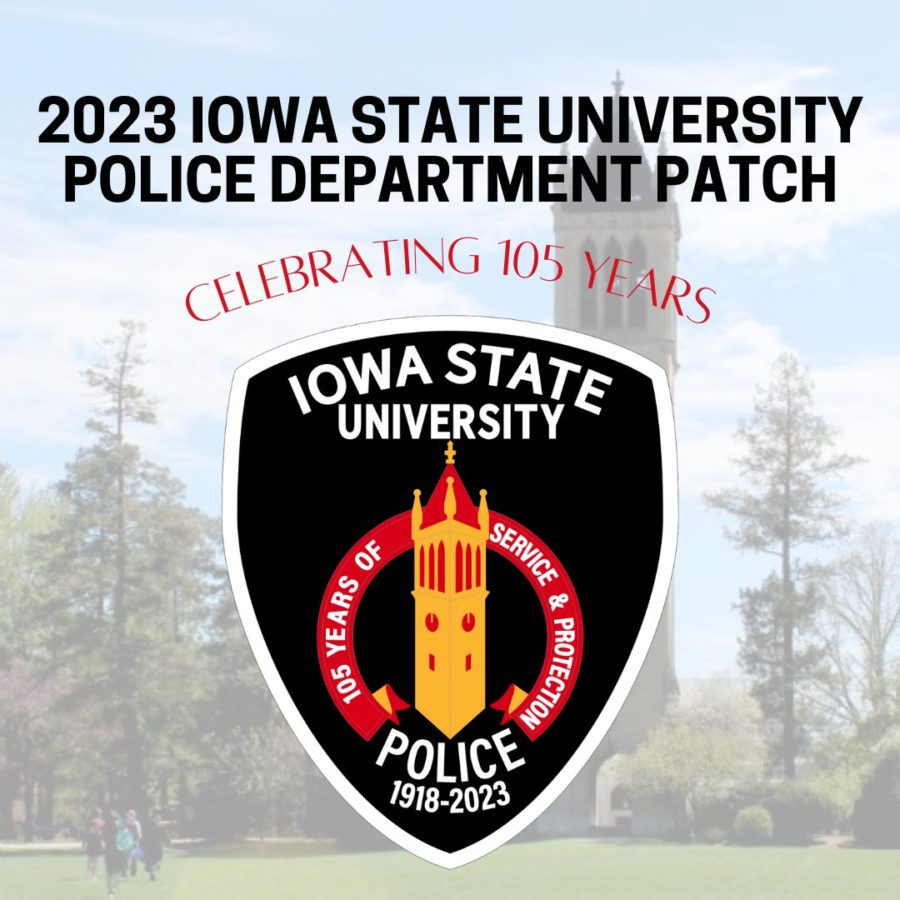Celebrating 105 years of law enforcement on Iowa State’s campus
The Iowa State Police Department is taking all of 2023 to celebrate its roots that brought them to where they are now.
January 18, 2023
The Iowa State Police Department is taking all of 2023 to celebrate its roots that brought them to where they are now.
The idea to celebrate the anniversary and the history of the department came from the officers.
“Several of us were sitting around the squad room table one night talking about when the first cop was here and where the department started,” police officer Adam Choat said.
A couple of the officers did research to find out when the first law enforcement appeared on campus. Their research revealed that campus law enforcement started in 1918 with a single ‘nightwatchman.’
The department missed the 100-year mark by five years, so they are now taking all of 2023 to celebrate.
“Our history actually happens to be pretty cool and was started in the roots of community policing, which started with Knute Hegland,” said assistant chief Carrie Jacobs.
Hegland initially was hired to work as a fireman at the heating plant on campus. He worked at the plant for 13 years until he was hired as the first night watchman in 1918. The position kickstarted law enforcement on campus.
His duties mostly included checking buildings and ensuring the Campanile gates were locked several times a night. He worked from about 7:00 p.m. to 5:00 a.m. each day.
Hegland saved lives in 1938 when a fire broke out in Margaret Hall, which was located around where Lebaron Hall is now. He was able to sound an alarm with enough time for all the female residents to escape to safety according to the university biographical dictionary.
Hegland was known to be very friendly and enthusiastic toward students. An Iowa State College freshman handbook from September 1940 mentioned Knute, stating, “His ‘fine night’ has become a campus classic because it represents the greeting of a true friend to every student.”
“The first nightwatchman was ingrained in the community, and that’s where people expect policing to go and want policing to go,” said chief of police Michael Newton. “That’s what we’ve been trying to strive for.”
Hegland’s legacy continues to encourage the department to be more community driven.
“We need our community and especially our students to know and to understand that not only are we here for them, but we’re also continually striving forward to try to get away from what you’re seeing nationally across the board,” Jacobs said.
Jacobs said she wants to avoid pushing policing history underneath the rug and for students to understand how the ISUPD has been a different police force from the beginning.
Jacobs and engagement and inclusion officer Natasha Greene have done work on a special educational segment about the history of policing. The project started in 2018 when they wanted to take the mask off policing in general.
“If we want to be true anti-racist and if we’re ready to go ahead and start dismantling the systemic racism that is obviously inherent in our society right now, we need to acknowledge the history first,” Jacobs said.
That intention is what drove the project forward. Jacobs and Greene submitted their presentation to the National Conference on Race and Ethnicity and were accepted. They presented their research to fellow police officers at the conference. Since then, the project has gained momentum. The pair also presented to the International Association of Campus Law Enforcement. They also now present it to various departments on campus.
The project serves as an offset to the main mission of the engagement and inclusion officer program.
“The Iowa State University Police Department Engagement and Inclusion Officer Team is committed to transforming Iowa State University into an inclusive community where freedom from all forms of power-based oppression,” according to the ISUPD’s website. “Including but not limited to racism, misogyny, transphobia, xenophobia, religious intolerance, classism, heterosexism, ageism, and ableism, allows each member to participate fully in our larger university mission.”
Throughout its history, many pieces of the department have evolved. Outside of the core pieces of training, such as driving and firearm safety, there has been more emphasis on mental health training and de-escalation training.
“I also don’t think people realize the other things that we’ve brought into the police department, like our mental health advocates and our therapy dogs,” Newton said. “Those things are meant to make us more ingrained and more part of the community.”
ISUPD strives to build relationships with students and faculty just like Hegland did back in 1918.
“Our main goals and functions and our true belief in community policing, community services and outreach efforts are what they were back then,” Choat said.
The department wants to celebrate its heritage by becoming more involved in events that support the community. For example, they had officers helping students take pictures at the holiday tree last semester while collecting donations for Toys for Tots.
“We want to be seen as that group that’s here to help and not seen in the way that sometimes nationally over the last couple of years, law enforcement has been,” Newton said. “We think we have something different here.”







